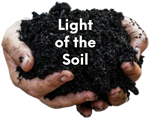One such initiative gaining momentum is the sponsorship program of Light of the Soil, that convert local food scraps into organic soil admendments. This approach offers a range of benefits that extend beyond waste reduction, contributing to a healthier environment, a stronger sense of community, and a more sustainable future.
Waste Reduction and Diversion
Food waste constitutes a significant portion of municipal waste streams. The Light of the Soil local food scrap to organic soil admendment sponsorships play a crucial role in diverting this waste from landfills and incinerators.
By transforming food scraps into nutrient-rich organic fertilizer, communities not only save precious landfill space but also curb the production of greenhouse gases that arise from organic matter decomposition in landfills. This waste reduction contributes to cleaner air, reduced odors, and a more attractive local environment.
Resource Conservation
The organic fertilizer produced by Light of the Soil, LLC from food scraps is a valuable resource for enriching soil and supporting plant growth. By sponsoring the conversion of food waste into organic soil admendments, communities reduce their reliance on synthetic fertilizers that can harm the environment through nutrient runoff and water pollution. The nutrient-rich compost nourishes the soil, promotes healthier plant growth, and aids in water retention, all while reducing the need for environmentally detrimental chemical fertilizers.
Carbon Footprint Reduction
Decomposing organic matter in landfills produces methane, a potent greenhouse gas that contributes to climate change. By diverting food scraps from landfills and converting them into organic fertilizer, local sponsorships significantly reduce methane emissions. This not only aligns with global climate goals but also helps communities take concrete steps toward reducing their carbon footprint and mitigating the impacts of climate change.
Soil Health and Agriculture
The benefits of locally produced organic fertilizer extend to agriculture and local food systems. The nutrient-rich compost improves soil structure, enhances water retention, and boosts overall soil health. These factors are essential for supporting local agriculture, community gardens, and urban greening initiatives. By fostering healthier ecosystems, communities can create a more resilient and productive local food supply, contributing to food security and sustainability.
Community Engagement and Education
The Light of the Soil local food scrap to organic fertilizer sponsorships are not merely about waste reduction; they are also powerful tools for community engagement and education. These programs offer opportunities for residents, schools, businesses, and local organizations to collaborate and work towards a common goal. Educational workshops, demonstrations, and outreach efforts raise awareness about composting, recycling, and sustainable practices, fostering a sense of environmental responsibility within the community.
Supporting the Local Economy
Sponsoring the Light of the Soil food scrap to organic fertilizer programs can stimulate the local economy. These initiatives will eventually create jobs in waste collection, composting facility operations, and fertilizer distribution. Furthermore, the availability of locally produced organic fertilizer supports local farmers and gardeners, promoting a circular economy where waste becomes a valuable resource.
Long-Term Sustainability
By promoting the Light of the Soil conversion of food scraps into organic fertilizer, communities are investing in their long-term sustainability. These sponsorships contribute to closed-loop systems where waste is transformed into a resource that enriches the land, supports biodiversity, and creates a healthier environment for current and future generations. This holistic approach to sustainability addresses both immediate waste reduction needs and long-term environmental resilience.
Conclusion
The Light of the Soil local food scrap to organic fertilizer sponsorships exemplify the power of community-driven initiatives in promoting sustainability, waste reduction, resource conservation, and community engagement. These programs create a positive cycle that benefits the environment, the local economy, and the overall well-being of residents. By recognizing the importance of turning waste into a valuable resource, communities pave the way for a greener, more sustainable future. Thank you and we hope you consider becoming a Light of the Soil sponsor today. Small step huge change.
